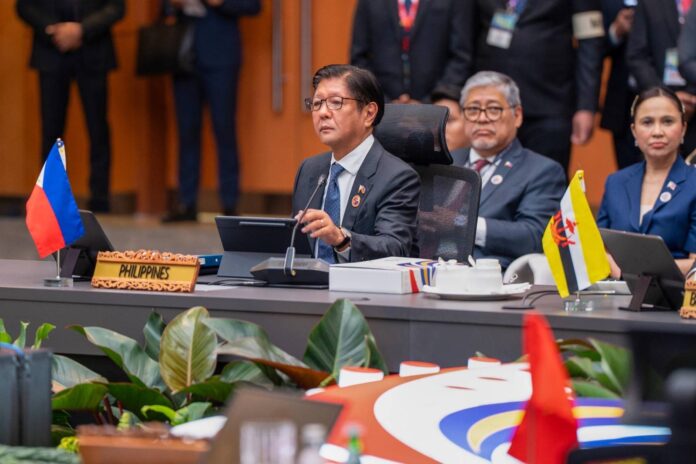President Ferdinand Marcos Jr. reiterated his call for the urgent adoption of a legally binding Code of Conduct (COC) in the South China Sea, warning that geopolitical tensions in the contested maritime region threaten stability and progress across Southeast Asia.
Speaking at the 46th ASEAN Summit hosted by Malaysia, President Marcos underscored the need for a formal agreement to protect the maritime rights of regional states.
“We underscore the urgent need to accelerate the adoption of a legally binding Code of Conduct in the South China Sea to safeguard maritime rights, promote stability, and prevent miscalculations at sea,” President Marcos told fellow ASEAN leaders.
The South China Sea, a vital global shipping route, has long been a flashpoint between China and several ASEAN member states — including the Philippines, Vietnam, Malaysia, and Brunei — all of which have overlapping territorial claims.
While talks between ASEAN and China have been ongoing for years, a binding code has yet to materialize.
The Philippines has consistently pushed for a stronger regional response to assert the rule of law and uphold the 1982 United Nations Convention on the Law of the Sea (UNCLOS), which the country has cited in its landmark 2016 arbitral victory over China’s sweeping maritime claims.
President Marcos said regional cooperation is key to managing tensions and ensuring the South China Sea remains a zone of peace, stability, and lawful commerce.
“In this increasingly interconnected world, we find ourselves, and our gains, at risk when our current stability is challenged,” he said, pointing to the potential for disruptions not only to supply chains, but to the hard-earned development of ASEAN economies.
The chief executive also emphasized ASEAN’s commitment to a rules-based international order, calling Malaysia’s chairmanship a “model of inclusive diplomacy,” and commending the consensus reached at the Special ASEAN Economic Ministers’ Meeting to avoid retaliatory actions amid rising global uncertainties.
While the summit focused on broad themes of inclusivity and sustainability, maritime security remained a top concern for the Philippines, which continues to face repeated incursions and harassment in its exclusive economic zone.
“As we chart our path forward, let us acknowledge the growing complexity of the challenges we face,” Mr. Marcos said.
“Yet by working together, strengthening our institutions, and building the resilience and capacities of our people, we can turn these challenges into opportunities for shared growth and stability,” the President added.
President Marcos also pledged to continue working with ASEAN partners to uphold peace and security in the region, while urging external partners to support a stable and law-abiding maritime order in Southeast Asia.









